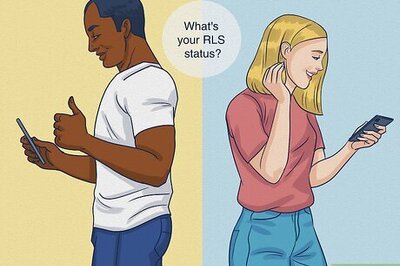
views
Gaza Strip: Israeli tanks and troops entered southern Gaza and planes attacked three bridges and knocked out electricity to the coastal strip early on Wednesday, stepping up the pressure on Palestinian militants holding captive a 19-year-old Israeli soldier.
The soldiers and tanks began taking up positions in two locations about a mile east of the Gaza town of Rafah under the cover of tank shells, according to witnesses and Palestinian security officials.
Palestinians dug in behind walls and sand embankments, bracing for a major Israeli offensive.
No casualties were reported in any of the attacks, marked by the first Israeli ground offensive in Gaza since it pulled out of the territory last summer, tearing down all 21 Jewish settlements.
The Israeli strikes came amid intensive diplomatic efforts in the Arab world and by the UN Secretary of State Condoleezza Rice urged Israel to ''give diplomacy a chance.''
Trying to defuse building tensions, negotiators from the ruling Hamas movement said Tuesday they had accepted a document implicitly recognizing Israel.
But two Syrian-based Hamas leaders denied a final deal had been reached.
Israel said only freedom for the captive soldier, Cpl. Gilad Shalit, could defuse the crisis, not a political agreement.
The Israeli military said in a statement that the object of the attacks on the bridges was ''to impair the ability of the terrorists to transfer the kidnapped soldier.'' Knocking down the bridges cut Gaza in two, Palestinian security officials said.
Early Wednesday, Israeli warplanes attacked one of the bridges for a second time, Palestinian security officials said. Before daybreak, Israeli warplanes flew low over Gaza city, causing sonic booms and breaking windows.
Overnight, Israeli planes fired at least nine missiles at Gaza's only power station, cutting electricity to much of the Gaza Strip, Palestinian security officials said. The station's three functioning turbines and a gasoline reservoir were engulfed in enormous flames that firefighters were unable to control.
The attack raised the specter of a humanitarian crisis in Gaza, as water pumps in the strip are powered by electricity. Some power in Gaza City was restored by tapping into electricity supplied by Israel in northern Gaza.
Masked militants from various armed factions took up defensive positions around Gaza City, instructing drivers to turn their headlights off. Militants from three armed factions said they fired a rocket early on Wednesday at the Israeli village of Nahal Oz, where Israeli forces are concentrated in a staging area.
In the Shajaiyeh neighborhood of Gaza City, not far from the fence, armed militants took up positions across from the blaring headlights of Israeli vehicles, and Israeli attack helicopters hovered overhead.
Early on Wednesday, Israeli forces fired machine guns at the empty streets, witnesses said.
The militants told residents to leave the area. They piled gasoline-soaked tires in the streets. Earlier, bulldozers blocked some of the main roads with piles of sand and dirt to try to slow down Israeli tanks.
PAGE_BREAK
Israeli military officials said Prime Minister Ehud Olmert approved a ''limited operation'' for southern Gaza, aimed at ''terrorist infrastructure.'' The officials spoke on condition of anonymity because they were not authorized to talk to reporters.
Some Israeli troops crossed the border into southern Gaza, near the site of Sunday's attack in which Shalit was abducted and two soldiers killed.
It was not immediately clear how many soldiers entered Gaza, though the army confirmed its soldiers were going in. A number of Israeli soldiers had been in Gaza since Sunday's assault.
Palestinian TV showed pictures of the first bridge hit, with fallen concrete blocks, twisted metal and protruding water pipes. Children walked in the wreckage.
Shalit's abduction Sunday by Hamas' military wing and two other Hamas-linked groups has threatened to turn already devastated relations between Israel and the Hamas-led government into an all-out war.
Hamas took over the Palestinian Authority after winning parliamentary elections in January, and has been under international pressure to renounce violence and recognize Israel.
White House press secretary Tony Snow said he had only seen media accounts of the Hamas-Fatah accord, but reiterated that Hamas had to meet three conditions before a crippling aid boycott could be lifted.
''Once again, we can all recite from memory now: recognize Israel's right to exist, renounce terror, and abide by all past agreements. Those are the preconditions,'' Snow said in Washington.
Complicating matters was a new claim by the Hamas-linked Popular Resistance Committees, one of the three groups that carried out Sunday's assault, that it had also kidnapped a Jewish settler in the West Bank.
Police spokesman Micky Rosenfeld said the report was being taken ''very seriously,'' and military officials said there was ''rising fears'' the claim was true.
After Israel launched its Gaza assault, the PRC threatened to kill its hostage.
The fate of the abducted soldier has riveted Israelis, with Shalit's face plastered on newspapers and callers to talk shows praying for his safety.



















Comments
0 comment